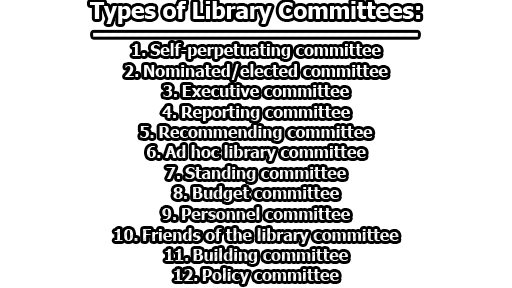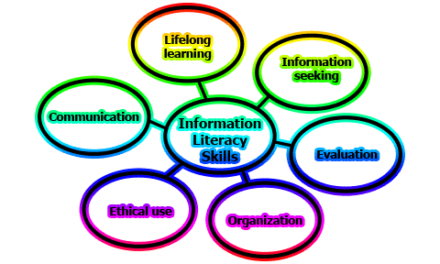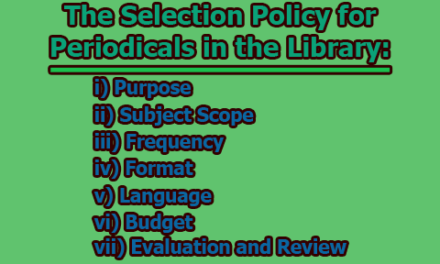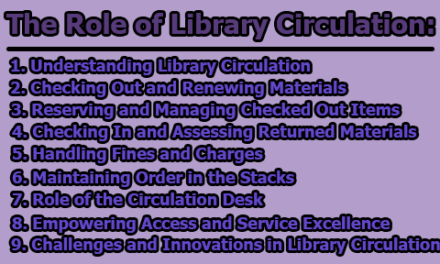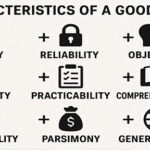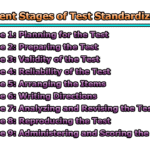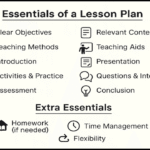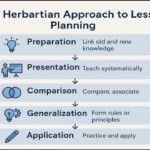A library committee consists of a group of people who oversee and manage the operations of a library. The members may include library staff, community representatives and individuals, from organizations or government bodies. In the rest of this article, we are going to know about the types of library committees and the responsibilities of a library committee.
Types of Library Committees:
Various types of library committees exist, each serving purposes. Some common types include:
- Self-perpetuating committee: This committee comprises individuals selected by committee members. They hold the task of appointing members as required to maintain the committees operations.
- Nominated/elected committee: Members of a nominated or elected committee are chosen by a group like the library staff or the community. They serve for a period and are replaced through a nomination or election.
- Executive committee: On behalf of the wider committee, decisions must be made by this committee. When the entire committee is unable to convene or is not in session, they frequently possess the power to make decisions.
- Reporting committee: This kind of committee is in responsibility for reporting on particular areas of the library’s operations, like circulation and finances. They could offer suggestions for enhancements or modifications and give the broader committee with regular reports.
- Recommending committee: This particular type of committee is in responsibility for evaluating proposals or concepts and recommending them to the broader group. For instance, a recommending committee may review ideas for brand-new services or programs offered by libraries and suggest which ones should be put into action.
- Ad hoc library committee: Committees of this kind are set up for particular purposes and dissolved after their work is over. For example, an ad hoc committee might be formed to organize a particular function or to review a certain set of guidelines or protocols.
- Standing committee: Committees of the sort typically stay up for a year or less, and they have well defined responsibilities. At the conclusion of the term, they are reorganized with a fresh group of participants. Standing committees may be elected or nominated, or they may be self-sustaining.
- Budget committee: This particular type of committee is in responsibility for looking over and approving the library’s budget, making sure that its funds are used sensibly and efficiently.
- Personnel committee: The hiring, promotion, and performance reviews of library employees fall within the authority of this type of committee.
- Friends of the library committee: Community members who support the library make up this type of committee. To support library services and programs, they could plan fundraising activities, speak out in favor of the library, or provide their time.
- Building committee: This type of committee is in the position of supervising the building or remodeling of library facilities. To make sure the building satisfies community needs and offers a warm and practical space for library patrons, they might collaborate with architects, contractors, and library staff.
- Policy committee: Develop and amend the policies that oversee the library’s operations is the responsibility of this kind of committee. In accordance with the goals and values of the library, they can evaluate current policies, determine areas in which new ones are required, and create new ones.
While every type of committee has its unique responsibilities and roles, they all aim to assist the library and make sure it serves the community’s needs as well as those of its patrons. Library committees can support the growth and ongoing use of the library as a vital community resource by cooperating and leveraging the knowledge of all committee types.
Responsibilities of a Library Committee:
Depending on the particular library and its goals, a library committee’s responsibilities may differ, but generally speaking they consist of:
- Strategic planning: Developing and implementing long-term goals and objectives for the library.
- Budgeting: Ensuring that the library has adequate funding to meet its operational needs, including staff salaries, collection development, and facility maintenance.
- Collection development: Deciding what materials to acquire and maintain in the library’s collection, including books, periodicals, and multimedia resources.
- Public relations: Promoting the library’s services and programs to the community, and advocating for its importance and value.
- Policy development: Creating policies and procedures for library operations, such as circulation, borrowing, and technology use.
- Staff management: Hiring, training, and supervising library staff, and ensuring that they have the resources and support to carry out their duties.
A library committee is essential to making sure the library is serving the public’s needs and achieving its goals. A library committee that combines a variety of viewpoints and areas of expertise can make well-informed choices that will help the library and its users.

Assistant Teacher at Zinzira Pir Mohammad Pilot School and College

